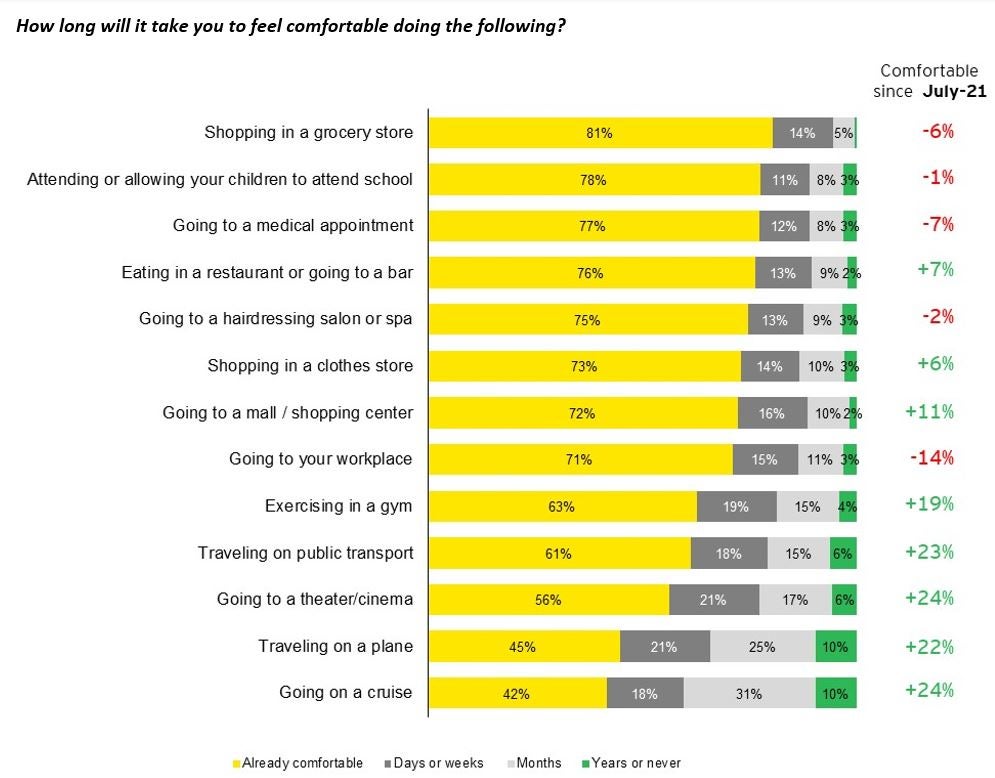EY refers to the global organization, and may refer to one or more, of the member firms of Ernst & Young Global Limited, each of which is a separate legal entity. Ernst & Young Global Limited, a UK company limited by guarantee, does not provide services to clients.

EY Malta’s 5th edition of the EY Future Consumer Survey indicates that attitudes towards out-of-home entertainment, especially travelling related activities, are perceived more positively today than at any other point since the outbreak of the pandemic. The number of respondents who would not seek an international vacation has decreased to 25% compared to 46% last July. Similarly, the proportion of respondents who are comfortable to go on a cruise increased to 42% from 18%.
There is also improvement in consumers’ financial optimism across the board, with 11% of respondents expecting to delay spending on big-ticket items compared to 28% in the previous survey.
Consumers around the world want to get back to a feeling of normality, but what will that normal look like?
Consumers have indicated that they expect to change the way they carry out various activities, from the way they travel, shop, work and socialise. Many consumers want and expect at least some of their forced changes to stick. As a result of the pandemic, they are enjoying the chance to live and work more flexibly, they have a better work-life balance, and they have saved money. Looking to the future, 35% want to keep working more flexibly, while 53% say that they have changed the way they look at life.

These local trends are very much aligned with a global survey conducted by EY across thousands of consumers. After two years of instability due to the COVID-19 pandemic, consumers in various countries seem to have come to expect uncertainty and disruption. They now want to make consumption choices that are less influenced around affordability and own health considerations, and more around quality of experience and broader value considerations.
Overall, EY’s research identifies three underlying considerations that consumers will have as they shape their new version of normal:
- Risk and threat have become everyday concerns: This “always on emergency” mindset is not only a result of living under COVID-19. The geopolitical and economic landscape has become increasingly unstable and unpredictable. Concerns about inflation are growing. Supply chains continue to be fragile. Climate change is increasingly becoming a priority. Financial and mental well-being has also been under stress, which affects how consumers feel about spending money. 35% of local consumers contacted say that they will decrease non-essential spending.
- People value quality more – of product, experience and time: Many learned to live with less during the pandemic and now are seeking to buy better rather than more. Consumers are avoiding spending on unnecessary products and experiences, not just because it’s good for their finances, but because it’s good for the planet. Our respondents tell us that 43% will focus on value from money in the future.
- Digital is becoming life’s default channel: technology was and is likely to remain a key enabler for consumer behaviours going forward. As many shifted to home or hybrid working, people leaned on online channels and remote interactions. The capability existed before COVID-19, but its adoption has been massively accelerated. As COVID-19 evolves and new crises emerge, consumers will continue to rely on digital to stay safe as well as manage their personal and professional lives. 40% of local consumers expect to keep using online channels for their shopping needs.
The festive shopping season will give us valuable insights into how fast consumer sentiment and behaviour is changing. Pent-up demand could drive sales higher with consumers looking to make up for lost time, but this must be balanced against the prevailing economic headwinds and continued supply chain shocks. For consumer products companies and retailers, this is a key chapter in the COVID-19 story. Will your business rebound? Can you reimagine your strategies for long-term value creation, aligning your purpose and portfolio around the consumer’s emerging post-pandemic priorities? This is an opportunity to become a relevant partner in the consumer’s effort to shape a new life. For many, this will require a profound transformation:
1. Analyse your festive sales season data with a different lens: Better analysis now will help businesses deliver against consumer and investor expectations in 2022 and beyond.
2. Invest in the data and technologies that can make you a trusted part of the consumer’s life: Companies that win and secure trust will become an integrated part of the consumer’s life.
3. Make it easy for people to move back and forth between physical and digital channels: Creating a cohesive experience and removing any points of friction will be fundamental to success.
4. Transform your business model for an age where people want to consume better, not buy more: More people are reshaping their consumption habits. Understanding what’s driving customers’ purchase behaviour could require a radical response from you.
Methodology
The 5th EY Future Consumer Survey Malta was carried out in October and November 2021 across a stratified random sample of 716 participants. The survey is conducted periodically to capture changes in consumption and consumer behaviour.
Gilbert Guillaumier is an Associate Partner at EY Malta within the Strategy and Transactions team.



